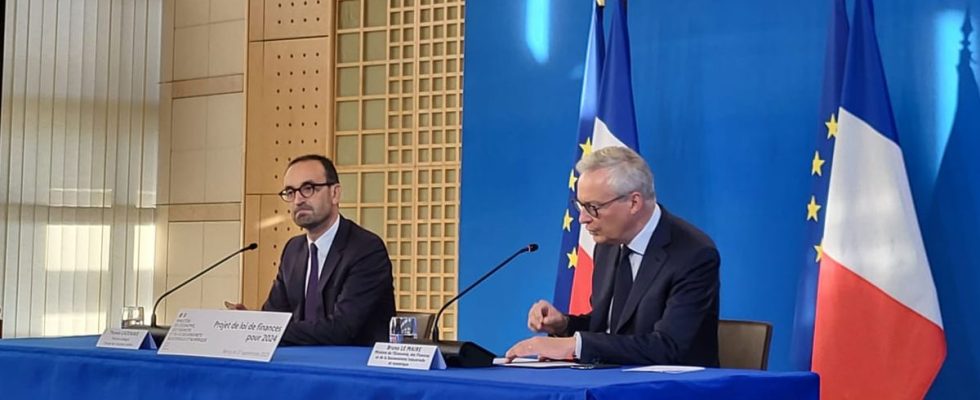At the Ministry of the Economy,
Wind of panic in the small world of “eco” journalists. This Wednesday morning, in the Bercy reception room, the pastries that generally welcome editors are missing. As a consolation prize, the drinks are there: orange, grapefruit, apple juice, coffee and tea… Restrictions and abundance, a bit like the two-headed image of the 2024 budget which is about to be presented.
For this new finance bill, the Minister of the Economy, Bruno Le Maire, and Thomas Cazenave, in charge of Public Accounts, have decided to ignore the proverb “Never chase two hares at the same time”. The result: a 2024 budget supposed to both fight inflation and reduce public spending. To make the task even more complex, Bruno Le Maire adds a third challenge: accelerating the ecological transition.
Conflicting objectives
These three rather contradictory objectives – the ministers make no secret of it – give this budget a rather strange appearance, continually going back and forth. On the one hand, 10 billion saved with the end of the tariff shield, on the other, 25 billion euros in additional spending by indexing social benefits to inflation. Including 14 billion for retirement pensions alone, increased by 5.2%. The retirement of the French, precisely, clearly illustrates the hesitations of the ministry: on my left, 14 billion spent to support the standard of living of seniors, on my right, a pension reform which Bruno Le Maire praises for the future savings it must to allow something to be done.
The title of this 2024 finance bill may well be “Controlling spending to invest in the future”, but it is inflation which is cited first, and whose expenditure is announced as a priority. It seems that the rise in prices sticks like old chewing gum to the shoe of Bruno Le Mayor, who presented his seventh budget this morning. In office since 2017, the minister has never hidden his intention to reduce public spending. An objective each time thwarted by a massive crisis: the “yellow vests”, Covid-19, and now inflation not seen since the 1970s.
1% savings on public spending in total
By dint of contortion and taking here what is given elsewhere, the minister, whose budget protects security and education, manages to make an overall saving of 5 billion euros compared to last year, i.e. 1% savings in total. A result well helped by the relative tranquility on the Covid-19 front, which is drastically cleaning up Social Security spending – the deficit was halved between 2022 and 2023.
Despite this result, even the meaning of Bruno Le Maire’s formula – “if the European Central Bank applies the monetary brake and we press the budgetary accelerator, we are going into the wall”, “inflation, the challenge of days past and days to come”, “we are not asking for lower prices, we are obtaining it” – struggles to hide the inconsistencies of a budget which, to put it without the minister’s lyricism, has its ass between two chairs.
And the ecological transition in all this?
In this conflict between the inflationary hammer and the anvil of reduced public spending, the third axis – the energy transition – looks more like the fifth wheel of the carriage. It is no coincidence that it is cited last. Out of a budget of 491 billion euros – compared to 496 in 2023, that’s good, you follow -, 40 are intended for the ecological transition, or 8%. Approximately the price of the tariff shield alone, 36.8 billion. A new tax is notably planned on motorway concessions and large airports, with the hope of bringing 600 million euros into the coffers.
You just have to see Bruno Le Maire lose his lyricism when a journalist questions him about thermal strainers. The minister spoke out on Tuesday in favor of a postponement of the ban on rental of these accommodations, supposed to arrive on January 1, 2025. “I do not want anyone to doubt the total – total – commitment of the Ministry of Finance for the ecological transition,” he asserts. Before citing many examples of actions and criticizing Brussels which would financially help non-European production. Five minutes of not talking about thermal strainers to conclude that the ban is on its way but that it requires “flexibility” and above all “clarity”. Like this bill.

